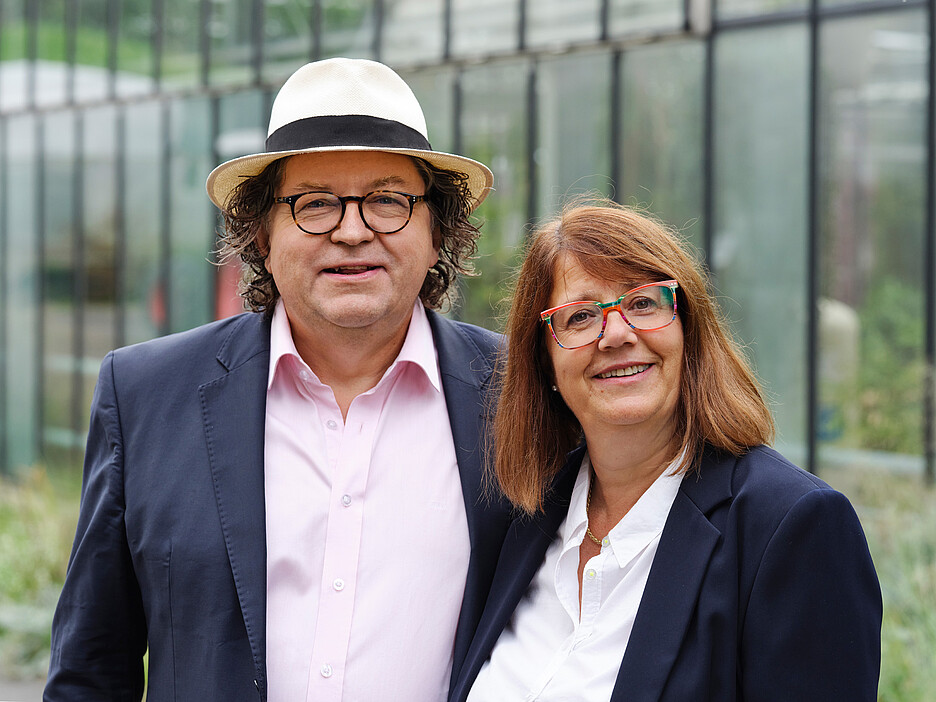
Planetary Health episode 6: Exponential food technology – revolutionising edibles
According to the UNEP Food Waste Index Report 2024, 170 kilograms of food are thrown away per person in Switzerland every year – the highest figure anywhere in Europe. This has to change. Exponential food technology opens the doors to a food system in which efficiency, sustainability and health seamlessly intertwine with one another.
We find ourselves at the cusp of an era in which food production is not only set to become faster and more efficient, but also smarter and more environmentally friendly. The basis for this revolution will be formed by a combination of advanced processing technologies, data analytics and artificial intelligence. For this to become a reality, however, we need a change in awareness, a change in our mindsets and nothing short of the reinvention of our food system.

Exponential food technology is not only about increasing production capacities, but also improving quality and protecting our environment. It is ushering in a new era in which food is not only produced, but also created smartly in a manner that is tailored to meeting the needs and wishes of consumers and preserving our planet.
From a rigid recipe to a dynamic formulation
Exponential food technology is an interdisciplinary, data-driven approach that draws on existing and new processing technologies with developments in the fields of machine learning, real-time analytics and sensor technologies in order to move from a standardised to a categorised food production system. A standardised system leads to exclusion if the required parameters are not fulfilled. The product can then only be used as animal feed or biogas or ends up as food waste. With categorisation, on the other hand, processing parameters and the formulation of the end product can be adjusted within certain limits, which means that the product can still be used as food for people. This innovative and more flexible framework paves the way for a transition from rigid recipes to dynamic compositions that are based on real-time data analyses and customer preferences.
Fewer losses and less waste
By replacing traditional batch processing (a recipe that is processed discontinuously) with continuous processing methods, this technology boosts efficiency (e.g. time, yield, space, labour) exponentially, reduces waste and improves the content of valuable ingredients (through the avoidance of time, temperature and oxidation stresses for sensitive substances). Thanks to these improvements in synergy, the technology represents an adaptable, self-optimising network that is able to gear food production towards changing consumer wishes and sustainability objectives while at the same time allowing for non-linear, disproportionate advances in terms of speed, quality, capacity, simplification and cost. The system can be adapted in line with regional differences and trends as well as to the availability of raw materials, a factor subject to increasing fluctuations in light of climate change.
From batches to a continuous process
Our research team is applying this technology to the food sector for the first time ever as part of cocoa processing. Performing the extraction procedure at relatively low temperatures ensures that more of the primary aroma is preserved, the very quality that represents the specific characteristics of cocoa beans such as the variety, region and vintage of the raw material. Only physical processes are used here, with no solvents other than water being utilised. By using water, the concentration of acetic acid and other undesirable volatile acids is reduced markedly. Bitters and tannins can be removed and modified in a manner that means the composition of the end product can be adapted to the specific target group, allowing them to enjoy it and savour the sensation of harmony it delivers with little added sugar.
Four essential elements of cocoa
Four essential elements are produced in this process: cocoa butter, flavouring, cocoa powder and dry cocoa extract. These components can also be processed in various configurations to produce a variety of foodstuffs and functional foods. The extraction procedure also allows for additional added value to be created by promoting the wider acceptance and utilisation of all of the products produced. This is achieved, in particular, by saving monomeric polyphenols, which are partially thermally destroyed during the conventional process and play an important role in the health benefits offered by cocoa and the products that contain it.
A laboratory and factory in one – the future of food production
We refer to the place where these innovative applications are implemented as a “labtory,” a fusion of the terms “laboratory” (a place of experimentation and innovation) and “factory” (a place of production). A “labtory” is thus a place of scientific discovery and technological development as well as a place of efficient production and manufacturing. A place where exponential food technologies are not only developed and tested, but are also used for large-scale food production. By combining these two concepts, the word “labtory” implies an integrated approach to food production that drives the development of exponential food technology forward.
Delegated photosynthesis and molecular upcycling
Plant cell cultures represent a further exponential process. Research conducted into energy production and conversion in cellular organisms has given rise to the innovative paradigm of “delegated photosynthesis.” Plants initially perform photosynthesis to produce a specialised complex nutrient medium. This medium then serves as the basis in a bioreactor in which plant cell cultures (e.g. cocoa or avocado) carry out further molecular upcycling. Interestingly, this process is refined in both stages, whereby the territorially bound plants from the field deliver primary photosynthetic products and the subsequent cell cultures improve the nutrient composition for human consumption. Current findings underscore the potential offered by “delegated photosynthesis” in terms of overcoming global nutritional problems and present a model that could serve to revolutionise human nutrition. The procedures developed for media production and the propagation of plant cell cultures are fully compatible with continuous processing.
All streams are main streams
Exponential food technology is more than simply a new method – it represents a paradigm shift that will take us on a journey where every step, innovation and refinement is part of a bigger picture, creating a resilient, sustainable and healthy food system for our planet and its inhabitants.

About the authors
Thinking and writing the unexpected is the motto of Gisela and Tilo Hühn, while their concept of life is underpinned by the endeavour to act responsibly together, adopt a reflective approach and make a difference. They work as researchers and lecturers at the ZHAW: Gisela Hühn as a member of the Food Process Development Research Group and Tilo Hühn as Head of the Centre for Food Composition and Process Design. Whether they are at the university or sat around their kitchen table, both enjoy joining forces or collaborating with others to discuss and work on future food systems and the question of how to get more of the goodness out of agricultural products during processing.
The “Planetary Health” series of the ZHAW’s “Impact” web magazine
Can our planet still be saved? And if it can, how? These are the questions addressed in the new “Planetary Health” series of the ZHAW’s “Impact” web magazine. As the content of the series is not yet set in stone, you –our readers – also have the opportunity to shape the path it takes and the issues it covers by sharing your suggestions and wishes. In the opening episodes of the series, ZHAW researchers Gisela and Tilo Hühn explain how we can save the world with food. The insights the researchers provide are by no means a light bite. Instead, they serve up a feast of information, detailing what is wrong with our food system and what negative impacts it has on the environment. While they don't offer any guaranteed recipes for ensuring our planet’s recovery, they plate up brain food aimed at promoting further thought and discussion. After all, “the battle to save the planet will be won at our dinner tables.” There is still a long way to go before we can sit back and enjoy a well-deserved dessert.
We look forward to receiving your ideas and suggestions directly below in the comments section.
0 Comments
Be the First to Comment!